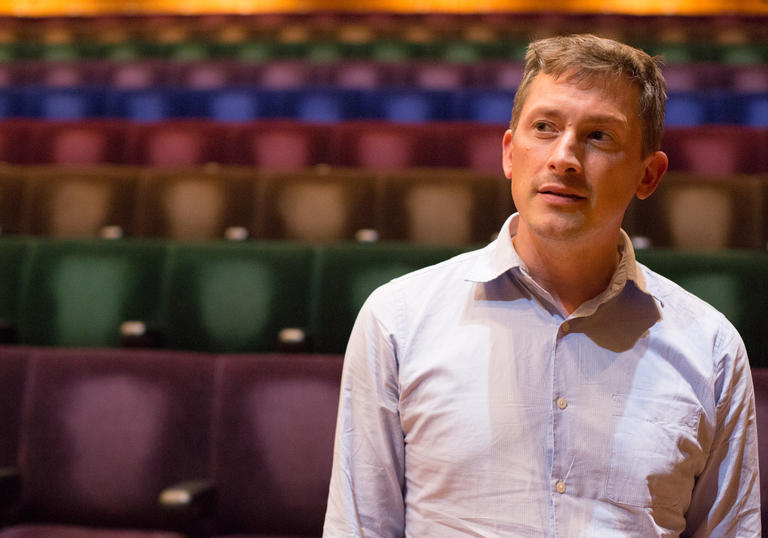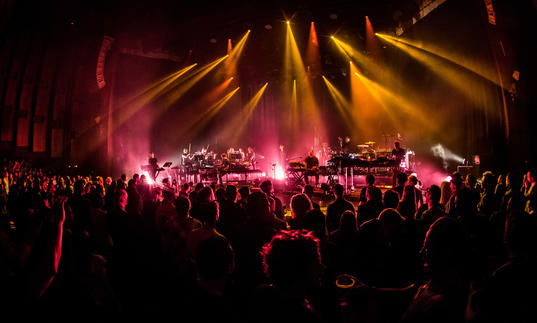We introduce you to the many faces of the Barbican, from curating to marketing, press to programming, gardening to gift shop, as we meet the people that bring the Barbican Centre to life every day.
Here, we meet Chris Sharp, the Barbican’s Contemporary Music Programmer.
Chris spent several years at various record companies before being appointed Managing Director of 4AD in 2000. He moved to the Barbican in 2008; since then, he has worked with Scott Walker, Steve Reich, Philip Glass, Nico Muhly, Grizzly Bear, Aphex Twin, These New Puritans, Chilly Gonzales and many more. Chris also programmes the Transcender series, which explores ecstatic and psychedelic music from all over the world.
How long have you been working at the Barbican?
Ooh, about four and half years, although I have no idea where that time went.
Talk us through your average working day.
Well, a lot of the time it’s indistinguishable from anyone else’s – I look at computers, write email, do budgets, go to meetings and talk to people on the phone. But I do spend quite a lot of time listening to music, which infuriates my colleagues because I can’t hear what they’re saying when I’ve got headphones on. And of course, I go to see a lot of concerts, in London and elsewhere, so there’s a fair bit of travelling and plenty of late nights. When there’s a show on, I’ll spend time in rehearsals and sound-checks, discussing things with the artists and making sure that everything is going smoothly.
What is the best part of your job?
The moments you remember are when you get close to the artists. Last Sunday I walked into Philip Glass’s dressing room and I found him giving the pianist Timo Andres some direction about playing his Piano Etudes – to be able to just sit there and listen to the two of them talking and playing was magical and it felt like an amazing privilege.
What is the most challenging part of your job?
You have to spend a fair bit of time thinking about money and sometimes arguing about money – but, although it sounds dull, there is a strange sort of exhilaration when you bring an event in, on or under budget. Not all artists – or their representatives – are necessarily susceptible to reason or the gentle arts of persuasion, so you do hit the odd impasse which needs to be negotiated more forcefully!
Do you have a favourite spot in the Barbican Centre or Estate?
I treasure the fact that I know how to get through the secret tunnel that leads from backstage in the Hall to the fire exit stage right in Cinema One – you can do the whole trip without emerging into a public space. But that’s not exactly picturesque, so I’ll go for the little semi-circular flower bed on the roof of the Beech Street tunnel which overlooks the USB building on Golden Lane – a quiet corner to sit with something appetizing from Whitecross Street on a sunny day.
What was the first performance or exhibition you saw at the Barbican?
It would have been the LSO at some point in the late 1990s – I couldn’t give you too many details, though! I remember coming to the Fay Godwin exhibition in the Gallery in 2001 and to increasing numbers of contemporary music shows from around that time, like the Outsider Art and Music show with The Delgados and Harry Partch, and the London Orbital event curated by Iain Sinclair.
What is your best Barbican memory or experience?
There are so many musical highlights that it’s hard to pick one out – the Jaga Jazzist show with the Britten Sinfonia last year was really exhilarating on a musical level, and the Aphex Twin one was incredibly difficult to pull off technically, so both of those inspired a real sense of achievement. And I remember featuring a Moroccan Sufi singer called Marouane Hajji in a concert called The Ecstatic Journey a couple of years ago – he’d never been in the UK before, but he gave an absolutely radiant performance and the warmth of the audience response was amazing. But really, the best experience happens every day – working with all the inspiring people all over this organization; there’s just so much talent, knowledge, enthusiasm and commitment on tap at the Barbican.
Outside the Barbican, what is your favourite thing to do/favourite place in London?
I like bikes, with and without engines. So an ideal non-musical day would feature a spot of spannering in the morning and a long ride in the afternoon. On a motorbike, I’d probably head off into the depths of Essex. On a pushbike, I might stay in town – there’s a regular route I do which goes down the Lee to the Isle Of Dogs, under the Greenwich foot tunnel, along the Thames Path to Woolwich and back across the river on the ferry to head up the Greenway back to Hackney. I could nominate anywhere on the River Lee as a favourite place, but a trip up to Springfield Marina to look at the boats is always fun.
Do you have any advice for people interested in pursuing a career in programming?
I get asked this quite often and there’s no single answer – so much depends on the individual, what they’re interested in and what they want to achieve. But the main thing is: don’t sit around waiting for someone to ask you to do something – do it yourself, whether it’s making a recording, releasing a record, putting on a show, whatever. Don’t be afraid to try and fail – you’ll learn something whatever happens. And “networking” is a hideous word but it’s hugely important – try and respond in an informed and intelligent way to the creative ideas you encounter, don’t be too keen to impose your own opinions or to make quick judgments about what is worthwhile, and stay in touch with the people who pique your interest. You’ll find that you build up a useful network of like-minded people, and with any luck that ecosystem will lead to opportunities.
Describe the Barbican in five words.
You’re kidding, right? It’s tempting to say ‘World Class Arts And Learning’, just to prove I’ve been paying attention, but how about ‘Slightly Insane Ideas Made Reality’?


